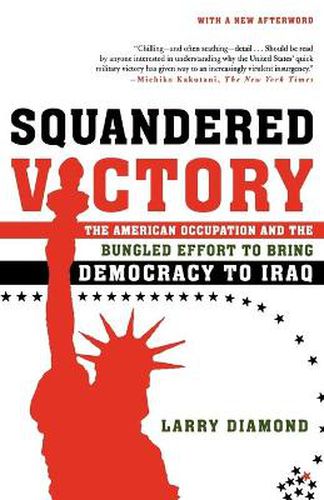Readings Newsletter
Become a Readings Member to make your shopping experience even easier.
Sign in or sign up for free!
You’re not far away from qualifying for FREE standard shipping within Australia
You’ve qualified for FREE standard shipping within Australia
The cart is loading…






This title is printed to order. This book may have been self-published. If so, we cannot guarantee the quality of the content. In the main most books will have gone through the editing process however some may not. We therefore suggest that you be aware of this before ordering this book. If in doubt check either the author or publisher’s details as we are unable to accept any returns unless they are faulty. Please contact us if you have any questions.
America’s leading expert on democracy delivers the first insider’s account of the U.S. occupation of Iraq-a sobering and critical assessment of America’s effort to implant democracy
In the fall of 2003, Stanford professor Larry Diamond received a call from Condoleezza Rice, asking if he would spend several months in Baghdad as an adviser to the American occupation authorities. Diamond had not been a supporter of the war in Iraq, but he felt that the task of building a viable democracy was a worthy goal now that Saddam Hussein’s regime had been overthrown. He also thought he could do some good by putting his academic expertise to work in the real world. So in January 2004 he went to Iraq, and the next three months proved to be more of an education than he bargained for.
Diamond found himself part of one of the most audacious undertakings of our time. In Squandered Victory he shows how the American effort to establish democracy in Iraq was hampered not only by insurgents and terrorists but also by a long chain of miscalculations, missed opportunities, and acts of ideological blindness that helped assure that the transition to independence would be neither peaceful nor entirely democratic. He brings us inside the Green Zone, into a world where ideals were often trumped by power politics and where U.S. officials routinely issued edicts that later had to be squared (at great cost) with Iraqi realities. His provocative and vivid account makes clear that Iraq-and by extension, the United States-will spend many years climbing its way out of the hole that was dug during the fourteen months of the American occupation.
$9.00 standard shipping within Australia
FREE standard shipping within Australia for orders over $100.00
Express & International shipping calculated at checkout
This title is printed to order. This book may have been self-published. If so, we cannot guarantee the quality of the content. In the main most books will have gone through the editing process however some may not. We therefore suggest that you be aware of this before ordering this book. If in doubt check either the author or publisher’s details as we are unable to accept any returns unless they are faulty. Please contact us if you have any questions.
America’s leading expert on democracy delivers the first insider’s account of the U.S. occupation of Iraq-a sobering and critical assessment of America’s effort to implant democracy
In the fall of 2003, Stanford professor Larry Diamond received a call from Condoleezza Rice, asking if he would spend several months in Baghdad as an adviser to the American occupation authorities. Diamond had not been a supporter of the war in Iraq, but he felt that the task of building a viable democracy was a worthy goal now that Saddam Hussein’s regime had been overthrown. He also thought he could do some good by putting his academic expertise to work in the real world. So in January 2004 he went to Iraq, and the next three months proved to be more of an education than he bargained for.
Diamond found himself part of one of the most audacious undertakings of our time. In Squandered Victory he shows how the American effort to establish democracy in Iraq was hampered not only by insurgents and terrorists but also by a long chain of miscalculations, missed opportunities, and acts of ideological blindness that helped assure that the transition to independence would be neither peaceful nor entirely democratic. He brings us inside the Green Zone, into a world where ideals were often trumped by power politics and where U.S. officials routinely issued edicts that later had to be squared (at great cost) with Iraqi realities. His provocative and vivid account makes clear that Iraq-and by extension, the United States-will spend many years climbing its way out of the hole that was dug during the fourteen months of the American occupation.